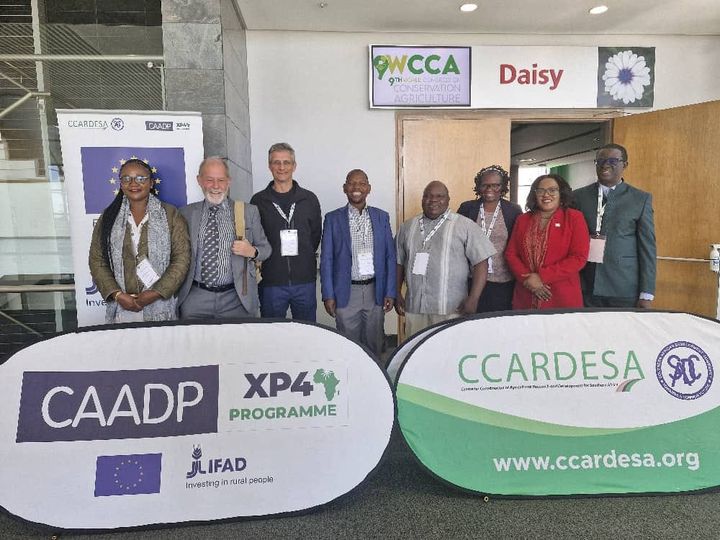CCARDESA Explores the Benefits of Agroecology and Conservation Agriculture in Enhancing Resilience of Smallholder Farmers

The Centre for Coordination of Agricultural Research and Development for Southern Africa (CCARDESA) participated in the 9th World Congress on Conservation Agriculture (CA) held in Cape Town, South Africa, from July 22 to 25, 2024.
The conference, held under the theme “Enhancing Agricultural Resilience by Strengthening the Impact of Conservation Agriculture,” brought together delegates from all over the globe in various capacities, ranging from scientists/researchers to farmers, academics, and others. CCARDESA, through the CAADP-XP4 Programme, hosted a side event on “Minimizing agroecology conflicts in the implementation of conservation agriculture on smallholder farms.”
The CCARDESA-led session on agroecology discussed the advantages and disadvantages of using herbicides in Conservation Agriculture (CA) and alternative methods available to farmers. A panel of experts shared their experiences from various farming systems, including cost-benefit analyses and reflections on how these approaches can be harmonized.
The Side-event was successfully steered by the following team of experts as panelists: Prof Regis Chikowo, an Agronomist; Mr. Diamon Kambewa, a Social Scientist; Mr. Sina Luchen, regional emergency and Resilience Agronomist at FAO; Prof Raymond Auerbach, an Organic Farmer and Scientist; and Dr Patricia Masikati, an Agroforestry Systems Scientist, who also facilitated the session.
Ms Futhi Magagula, the CAADP-XP4 Programme Officer, welcomed participants in this session. She mentioned that CCARDESA has been engaging with various stakeholders to raise awareness about the possible role of agroecology in responding to the call from the Food Systems Transformation and building resilience in the agricultural sector. She further expressed her gratitude to the European Union (EU) for funding the event and the International Fund for Agricultural Development (IFAD) for technical assistance through the CAADP-XP4 Programme. Furthermore, she gave background information about CCARDESA roles in coordinating regional agricultural research and development programmes.
Dr Stephen Greenberg, an Agroecology Scientist, gave a keynote presentation on the transition towards agroecological agriculture. In his presentation, he highlighted how agroecology is defined using various terminologies. Prof Greenberg explained the 13 principles of agroecology, which help people find common ground in understanding agroecology. He emphasized synergy as an integrated approach, environmental sustainability, social justice, and economic democratization.
In his presentation, he pointed out how agroecology has gained momentum in recent years, as it is considered a sustainable farming method. The existing Agroecology coalition has emerged from the UN Food System Summit in 2021, to which 19 African Governments are signatories and use these principles as a base. This means that governments and civil societies have accepted it. Methodologies were therefore developed using those principles to determine practices. Based on Agroecology practices, soil health emerged as the most beneficial factor in combining agroecology and CA. Others include biodiversity, fertility measures, no-till, cover cropping, mulching, cover cropping, economic diversification, and others.
In addition to the 13 agroecology principles, Prof Greenberg further pointed out other key aspects of agroecology, including farmer rights, international treaties on Plant Genetic Resources for Food and agriculture, and traditional indigenous crop retention. He further emphasized the importance of working with farmers in CA, recognizing that farmers have better knowledge. In conclusion, Prof Greenberg highlighted the red flags of agroecology, which include, among others, the promotion of synthetic fertilizers and pesticide use. CA involves the shift away from practices of applying chemicals to a more organic way of farming. To help smallholder farmers from an agroecological point of view, the focus should be on changing the mindset and finding alternative ways of farming in a natural way and forgoing chemical use. The use of chemical pesticides must be excluded in CA as they are detrimental to soil health. Healthy soil results in healthy plants and healthy animals. Soil health is the most important aspect of agroecology and CA.
The presentation by Prof. Greenberg was followed by a panel discussion of experts who shared their views and approaches to agroecological principles. The deliberations covered the benefits of CA in the Food Systems Transformation, the sustainability of weed management in conservation agriculture which relies on a significant agroecological or integrated weed management principle, reflection on whether weed management should be recognized as a fourth principle in conservation agriculture, the use of bio-solutions towards supporting conservation agriculture, key aspects of research needed to make conservation agriculture more relevant to the transition towards agroecological food systems, implications from the adoption of CA/Agroecology: on Food Security.
One particular concern with the assessment of agrifood systems is the ‘level playing field’. For example, agroecologically intensified systems have been critiqued for being less productive or profitable than industrially intensified systems, not taking into account the broader benefits of CA/Agroecology versus the negative impacts on the environment and society. Professor Daimon Kambewa from Lilongwe University of Agriculture and Natural Resources (LUANAR) emphasized the importance of community mobilization for agroecological production, drawing from insights gained from the experience in Malawi. Dr Paticia from the Center for International Forestry Research and World Agroforestry (CIFOR-ICRAF) emphasized the need for strategies to provide incentives for positive externalities, encouraging farmers to adopt conservation measures and restore natural resources.
The main point of the discussion was that priority in CA should be given to small-scale farmers to help them adopt all CA principles through crop diversification while integrating livestock into their farming simultaneously. It was also observed that small-scale farmers, who are classified based on their land size, face challenges that make it difficult to adopt CA. These farmers generally have small land areas, yet they are expected to feed their household members. As a result, their focus is on producing staple crops, neglecting the concept of CA. Due to this imbalance, it would be difficult for them to practice CA in its true sense. Thus, there is a need for intensification to free land on the farm for more crops and, in the process, allow farmers to practice CA in its entirety. Moreover, there is need to intensify ecological practices to adhere to the principles of sustainable agriculture. The focus should not only be on practicing CA principles but also on exploring what ecology has to offer.
The panel of experts identified critical areas of research needed to make CA more relevant to Agroecological systems. These areas include improving soil health and conditioning to create aerobic conditions and enhance fertility, understanding nitrogen dynamics and soil organic matter, and identifying cash crops suitable for farmers in different agroecological zones, among other factors. The principles of building the local economy, promoting partnerships, empowering farming communities, practicing fairness and equity, and ensuring good governance can encourage farmers to adopt agroecological farming.
The take-home message was that agroecology is a holistic approach towards sustainable farming despite the effects of climate change. It encompasses not only scientific principles but also social and economic aspects that require community involvement. The European Union funded this event under the CAADP-XP4 Programme.

























































